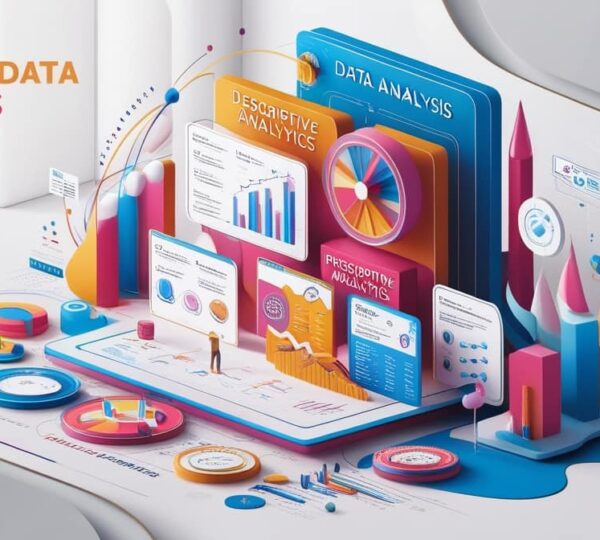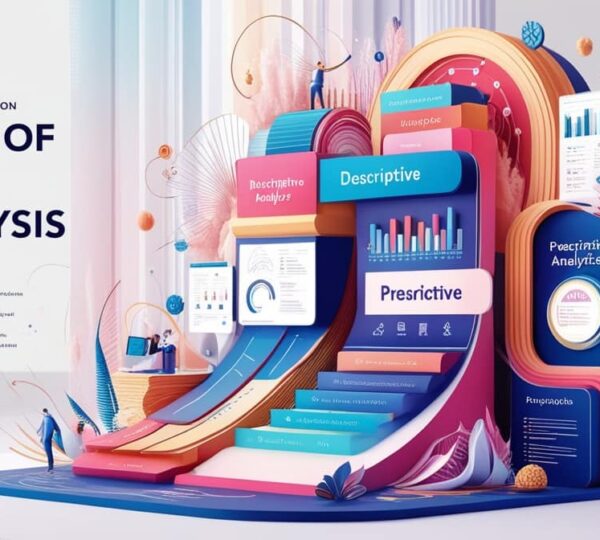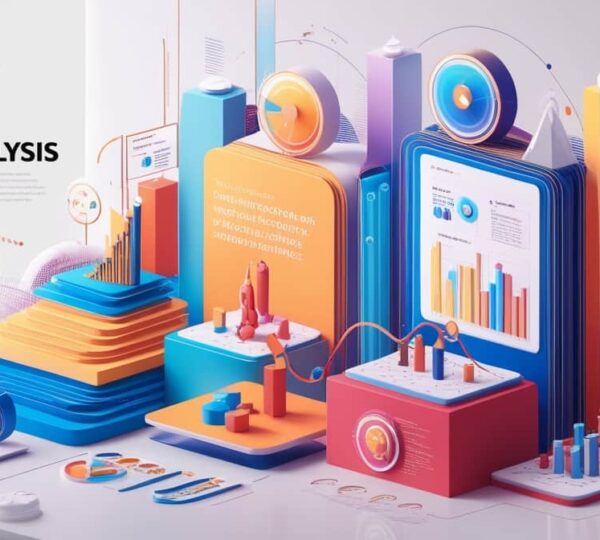Types Data Analysis: Unlock Different Approaches to Data

Types Data Analysis: Unlock Different Approaches to Data
Data analysis is a cornerstone of modern business operations, enabling companies to make informed decisions, optimize processes, and gain a competitive edge. For a company like Rapid Phone Center, understanding and implementing various data analysis techniques is crucial for enhancing customer satisfaction, improving operational efficiency, and driving growth.
Data analysis involves systematically applying statistical and logical techniques to describe, summarize, and compare data. In a business context, it helps in identifying patterns, establishing relationships, and making data-driven decisions.

Types of Data Analysis
Rapid Phone Center simplifies complex processes with actionable insights. An effective research data analysis example includes identifying customer trends to enhance service delivery. By leveraging descriptive, predictive, and prescriptive analytics, we help businesses optimize strategies, improve decision-making, and drive measurable success. Let us transform your data into growth opportunities. Unlock insights with Data Mining and Statistical Analysis, transforming raw data into actionable knowledge for better decision-making.
There are several types of data analysis, each serving a unique purpose:
- Descriptive Analysis: This type focuses on summarizing historical data to understand what has happened in the past. For instance, Rapid Phone Center can use descriptive analysis to assess past sales performance and customer demographics.
- Diagnostic Analysis: This analysis delves deeper to understand why something happened. If there’s a sudden drop in sales, diagnostic analysis can help identify the underlying causes.
- Predictive Analysis: By utilizing statistical models and forecasting techniques, predictive analysis estimates future outcomes. Rapid Phone Center can predict future sales trends based on historical data and market conditions.
- Prescriptive Analysis: This advanced analysis suggests possible courses of action. For example, it can recommend optimal inventory levels to meet anticipated customer demand.
- Exploratory Analysis: Used to find patterns or relationships in data without prior hypotheses. This can help in discovering new market segments or customer preferences.
- Inferential Analysis: This type makes inferences about a larger population based on a sample of data. It can be useful for understanding customer satisfaction levels across different regions.
- Causal Analysis: Focuses on identifying causation, not just correlation. For instance, determining whether a marketing campaign directly led to an increase in sales.
- Mechanistic Analysis: Examines the exact changes in variables that lead to changes in other variables, often used in scientific research.
Understanding these types helps in selecting the appropriate analysis method for specific business needs. Explore powerful Data Analysis Techniques to uncover trends, patterns, and insights, driving informed decisions and strategic growth.

At Rapid Phone Center, we offer expertise in every data analysis type to drive your business forward. From descriptive analytics for trend insights to predictive models for future forecasting, our solutions are tailored to your needs. Let us turn your data into actionable strategies, ensuring smarter decisions and measurable results for sustained growth and success. Discover the various Types of Data Analysis, from descriptive to predictive, to extract valuable insights and guide data-driven decisions.
Data Analysis in Research
What is data analysis in research? At Rapid Phone Center, it’s the process of examining, organizing, and interpreting data to uncover valuable insights. We specialize in transforming complex data into actionable strategies through advanced analytics tools. Trust our expertise to optimize your research efforts, streamline decision-making, and drive impactful results for your business.
In a research context, data analysis involves several key steps:
- Data Collection: Gathering relevant data through surveys, experiments, or existing databases.
- Data Cleaning: Removing inaccuracies and inconsistencies to ensure data quality.
- Data Coding: Assigning codes to qualitative data for easier analysis.
- Data Interpretation: Drawing meaningful conclusions from the analyzed data.
For example, if Rapid Phone Center conducts a customer satisfaction survey, the data collected would be cleaned, coded, and analyzed to identify areas for improvement. Streamline your business with Ecommerce Fulfillment, ensuring fast, efficient order processing and timely delivery for customer satisfaction.
Rapid Phone Center specializes in advanced data analysis types to empower your business. Whether it’s descriptive, diagnostic, predictive, or prescriptive analytics, our tailored solutions transform raw data into actionable insights. Trust us to streamline decision-making, improve strategies, and drive measurable success with our comprehensive data analysis expertise.

Research Tools for Data Analysis
Rapid Phone Center provides cutting-edge research tools for data analysis to enhance your business strategies. Our tools support descriptive, predictive, and diagnostic analytics, offering actionable insights for smarter decision-making. With advanced software and techniques, we help you uncover trends, optimize processes, and achieve measurable results through efficient data analysis solutions. Enhance efficiency with Back Office Services, managing essential tasks like data entry, payroll, and customer support to boost business operations.
Several tools can assist in data analysis for research purposes:
- NVivo: A qualitative data analysis tool that helps in organizing and analyzing non-numerical data.
- Quirkos: Simplifies coding and analyzing qualitative data, making it accessible for teams.
- Dovetail: A platform for analyzing qualitative research data, particularly useful for customer feedback.
- Thematic: An AI-driven tool that analyzes open-ended survey responses to identify themes and sentiments.
These tools can help Rapid Phone Center efficiently analyze research data to gain actionable insights.
Discover the Rapid Phone Center’s expertise in various types data analysis to optimize your business strategies. From descriptive and diagnostic to predictive and prescriptive analytics, we tailor data-driven solutions to meet your unique needs. Let us help you uncover insights, enhance decision-making, and achieve measurable success through advanced data analysis techniques. Quantitative Data of Analysis involves examining numerical data to identify patterns, trends, and relationships for informed decision-making.

Implementing Data Analysis at Rapid Phone Center
To effectively implement data analysis, Rapid Phone Center should consider the following steps:
- Define Objectives: Clearly outline what you aim to achieve with data analysis, such as improving customer satisfaction or increasing sales.
- Select Appropriate Data Analysis Types: Choose the type of data analysis that aligns with your objectives, whether it’s descriptive, predictive, or another type.
- Utilize Research Tools: Employ suitable tools to facilitate the analysis process, ensuring they meet your specific needs.
- Train Staff: Ensure team members are trained in data analysis techniques and tool usage.
- Interpret and Act on Findings: Analyze the results and implement strategies based on the insights gained.
By following these steps, Rapid Phone Center can leverage data analysis to make informed decisions and drive business success. Revolutionize support with AI Customer Service, offering quick, efficient solutions through intelligent chatbots and automated responses for better experiences.
Understanding the various types of data analysis and their application in research is essential for any business. By utilizing appropriate research tools and implementing effective data analysis strategies, Rapid Phone Center can enhance its operations and achieve its business objectives.
In the digital age, data is a cornerstone for informed decision-making. At Rapid Phone Center, we understand the critical role of research data analysis in unlocking actionable insights. This guide dives deep into the methods and significance of data analysis in research, ensuring you can harness its full potential to achieve your objectives.

Data Analysis of Research: Methods, Tools, and Best Practices for Accurate Insights
Research data analysis refers to the process of systematically examining data collected during research to extract meaningful patterns, trends, and conclusions. Whether it’s a business looking to understand customer behavior or a scientific team testing hypotheses, the analysis of data in research is fundamental to producing accurate and reliable results.
Conducting research without proper analysis is like gathering ingredients but failing to cook a meal. The data analysis of research transforms raw data into digestible and actionable insights. At Rapid Phone Center, we emphasize structured methodologies to:
- Identify significant trends.
- Validate hypotheses.
- Provide evidence-based recommendations.
Proper data research analysis ensures that decisions are not just intuitive but backed by robust findings, minimizing risks and maximizing efficiency.
Key Steps in Data Analysis Research
- Data Collection Every analysis begins with data. Collecting reliable and relevant data is crucial for accurate data analysis of a research project. At Rapid Phone Center, we advocate for rigorous sampling methods and data collection techniques to ensure credibility.
- Data Cleaning Before diving into analysis of data research, data must be prepared. Cleaning involves removing inaccuracies, handling missing values, and standardizing formats. Clean data is the foundation of any successful analysis.
- Exploratory Data Analysis (EDA) EDA involves visually inspecting the data to identify patterns and outliers. Techniques like scatter plots, histograms, and box plots help lay the groundwork for deeper data research analysis.
- Hypothesis Testing A critical step in analysis of research data is testing predefined hypotheses. Statistical methods such as t-tests, ANOVA, and regression analysis are used to validate or refute assumptions.
- Data Interpretation The final step is interpreting the results of the data analysis in a research context. This involves linking findings back to the research objectives, drawing conclusions, and making recommendations.

Technology has revolutionized how we conduct analysis research data. Today, advanced software and tools simplify complex analyses. Some popular tools include:
- SPSS: Ideal for statistical analysis.
- Excel: A versatile tool for basic data manipulation.
- Tableau: Excellent for data visualization.
- R and Python: Open-source tools for advanced data modeling.
At Rapid Phone Center, we utilize cutting-edge software to ensure precise data analysis of research projects, catering to diverse industries and objectives.
Despite its importance, the analysis of data in research comes with challenges:
- Data Quality Issues: Inaccurate or incomplete data can compromise the integrity of findings.
- Complex Data Sets: Handling large volumes of data requires advanced analytical tools and expertise.
- Bias in Interpretation: Ensuring objectivity in the data research analysis process is essential to avoid skewed conclusions.
At Rapid Phone Center, we’ve mastered the art of addressing these challenges. Our experts employ meticulous methods to ensure accuracy and reliability in every analysis of research data project.

Why Choose Rapid Phone Center for Your Data Research Analysis?
At Rapid Phone Center, we combine expertise with cutting-edge tools to deliver unparalleled data analysis of research services. Here’s why clients trust us:
- Tailored Solutions: We customize our approach to suit the unique needs of each data research analysis project.
- Experienced Team: Our analysts are seasoned professionals with extensive experience in data analysis in a research context.
- Advanced Tools: We leverage the latest software and methodologies to ensure accuracy and efficiency in every analysis of research data task.
- Comprehensive Reporting: Beyond analysis, we provide detailed reports that highlight key findings and actionable insights.
The analysis of data in research is a powerful tool for understanding complex phenomena and making informed decisions. Whether you’re navigating market trends, improving operational efficiency, or testing scientific theories, effective data analysis of a research project is non-negotiable.
At Rapid Phone Center, we’re committed to helping you harness the power of research data analysis. Contact us today to learn how our expertise can elevate your projects and deliver results that matter.
Frequently Asked Questions
Discover Rapid Phone Center’s Frequently Asked Questions for types of data analysis, offering insights into methods, tools, and techniques.

What is big data analytics?
Big data analytics refers to the process of examining large and complex datasets, often from multiple sources, to uncover hidden patterns, correlations, and insights that traditional data processing methods cannot handle.
How does data analytics help in decision-making?
Data analytics helps organizations make informed decisions by providing evidence-based insights that guide strategies, improve operational efficiency, and optimize resource allocation.
What is the role of data analytics in business?
Data analytics plays a vital role in business by helping organizations improve customer experiences, optimize operations, increase revenue, and enhance decision-making through data-driven insights.
What is exploratory data analysis (EDA)?
Exploratory Data Analysis (EDA) involves using statistical graphics, plots, and other techniques to visually explore and understand the dataset before performing formal modeling or analysis.
You might also find our article intriguing:
Good Luck to You 🌊




